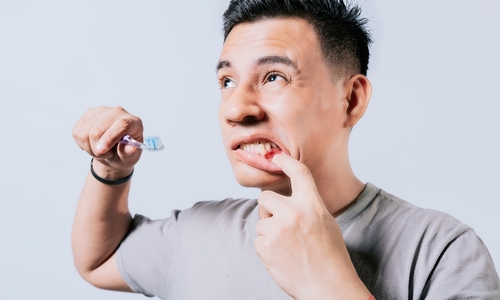
Bleeding gums can be an alarming sight, especially when you’re brushing or flossing. If you’ve noticed this issue, you’re not alone—many people in Millcreek, UT, and throughout Salt Lake County experience gum bleeding at some point. But why does it happen, and what can you do about it? At Warr Dental, we’re here to help you understand the causes of bleeding gums and how to treat and prevent this common issue.
Common Causes of Bleeding Gums
Bleeding gums can be caused by a variety of factors, ranging from something as simple as brushing too hard to more serious conditions that require professional care. Here are some of the most common reasons your gums might be bleeding:
- Gingivitis: Gingivitis, the earliest stage of gum disease, is one of the most common causes of bleeding gums. It occurs when plaque—a sticky film of bacteria—builds up on your teeth and irritates your gums. Symptoms of gingivitis include red, swollen gums that may bleed easily, especially during brushing or flossing. The good news is that gingivitis is reversible with proper oral hygiene and regular dental cleanings.
- Brushing Too Hard: If you’re using a hard-bristled toothbrush or applying too much pressure when brushing, you could be causing your gums to bleed. While it’s important to clean your teeth thoroughly, it’s also crucial to be gentle. At Warr Dental, we recommend using a soft-bristled toothbrush and brushing in gentle, circular motions to protect your gums.
- Flossing Incorrectly or Inconsistently: If you’ve recently started flossing or haven’t been flossing regularly, your gums might bleed as they adjust to the new routine. Bleeding should subside after a few days of consistent flossing, but if it doesn’t, it could be a sign of an underlying issue.
- Medications: Certain medications, such as blood thinners, can increase the likelihood of gum bleeding. If you’re taking medication and notice that your gums are bleeding more than usual, it’s important to inform your dentist so they can provide appropriate care and advice.
- Vitamin Deficiencies: A lack of essential vitamins, particularly vitamin C and vitamin K, can lead to gum bleeding. These vitamins play a crucial role in maintaining healthy gums and overall oral health. If you suspect a deficiency, consider adjusting your diet or speaking with a healthcare provider.
- Hormonal Changes: Hormonal changes, particularly during pregnancy, menstruation or menopause, can make gums more sensitive and prone to bleeding. This condition, often referred to as pregnancy gingivitis, typically resolves after hormone levels stabilize, but maintaining good oral hygiene is essential during these times.
- Infections or Systemic Conditions: In some cases, bleeding gums can be a sign of a more serious infection or underlying health condition, such as diabetes or leukemia. If you’re experiencing persistent gum bleeding along with other symptoms, it’s crucial to seek professional medical advice.
What Should You Do If Your Gums Are Bleeding?
If you notice that your gums are bleeding, the first step is not to panic. Instead, consider the following actions:
- Improve Your Oral Hygiene Routine: Make sure you’re brushing twice a day with a soft-bristled toothbrush and flossing daily. This will help remove plaque and prevent gum disease.
- Schedule a Dental Checkup: If the bleeding persists, it’s time to visit Warr Dental in Millcreek, UT. Our team can assess your gum health, identify the cause of the bleeding and recommend the appropriate treatment.
- Evaluate Your Diet and Lifestyle: Ensure you’re getting enough vitamins in your diet and consider making lifestyle changes, such as quitting smoking, which can improve your gum health.
- Be Gentle with Your Gums: Switch to a softer toothbrush if needed and use gentle techniques when brushing and flossing.
How to Prevent Bleeding Gums
Preventing bleeding gums involves maintaining a consistent and gentle oral care routine. Here are some tips to keep your gums healthy and bleed-free:
- Regular Dental Visits: Schedule regular cleanings and checkups at Warr Dental. Professional cleanings help remove plaque and tartar that you can’t reach at home, preventing gum disease.
- Healthy Diet: A diet rich in vitamins and minerals, particularly vitamin C and K, can support gum health. Incorporate plenty of fruits, vegetables and leafy greens into your meals.
- Avoid Tobacco Products: Smoking and using other tobacco products can irritate your gums and increase the risk of gum disease. Quitting these habits can improve your oral and overall health.
Concerned About Bleeding Gums?
If you’re experiencing bleeding gums, it’s important to address the issue before it leads to more serious problems. At Warr Dental in Millcreek, UT, our experienced team is here to help you achieve and maintain healthy gums. Call us today to schedule an appointment, or use our online scheduler to book your visit. Let’s work together to keep your smile healthy and your gums strong.




